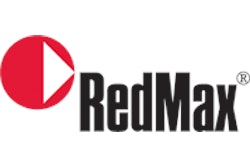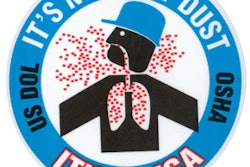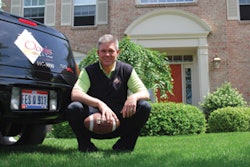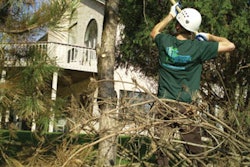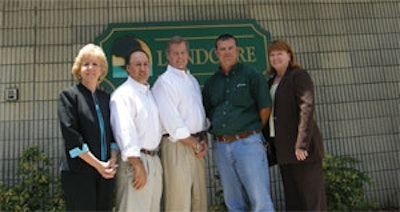
The Landcare Group
Tampa, FL
landcare1.com
Founded: 1972
Owner: K.C. Fisher
Employees: 40
Sales Mix: 75% commercial landscape maintenance, 15% enhancements, 10% irrigation repair
Maintenance equipment includes 15 Exmark riding mowers, six Exmark walk-behind mowers, 35 RedMax backpack blowers, 30 RedMax string trimmers, 28 RedMax edgers, 31 RedMax hedgetrimmers, 14 RedMax chainsaws, five Stihl pole saws, one Morbark tub grinder
Installation equipment includes two Bobcat skid-steer loaders, one Komatsu loader, one Hitachi excavator
Lawn care equipment includes one Spray Max mobile fertilization rig, one Isuzu lawn spraying truck
Vehicle fleet includes 13 Ford F-150 and F-250 pickups, three Ford Ranger pickups, two Ford Explorers, two Ford F-450 landscape trucks,
one International dump truck
After 37 years in business, K.C. Fisher, president of Tampa-based The Landcare Group, knows what it takes to be a success. “It’s all about having a passion for what you do,” says Fisher, whose commercial lawn maintenance company employs 40 people and brings in upwards of $2.5 million annually.
“I started out as small as you can, grew to three locations, but now operate out of one location at about the same level of sales that we had in 1992,” Fisher goes on to say. “I discovered that being big isn’t always what it is cracked up to be. And unless you have the right management systems in place, excessive growth can create headaches.”
Fisher says that most of his headaches are gone today. He absolutely enjoys going to work, despite the sketchy economy, thanks in large part to a family-like company culture and knowledge that his systems today are producing results.
INNOVATOR
A 1974 graduate of the University of South Florida with a degree in finance, Fisher admits to being a bit of an innovator. His company name suggests that. “I came up with the name after a marketing class at USF,” he explains. “To my knowledge, we were the first to coin the word Landcare, although we obviously haven’t been the last. Still, we have the copyright to the name in this state, and it has served us well for several decades.”
This entrepreneur talks about some of his other innovations over the last 30-plus years. “In 1984, I created a bidding/estimating system from scratch, employing a college senior (who four years later came to work for us as our Orlando branch manager) to do the legwork. He actually conducted a square-foot-based time study of every job function on every job. It took him six months to compile the data and come up with the production factors and corresponding ratios.”
Eight years ago Landcare turned green before it was popular to do so. “We purchased some industrial-zoned land and a tub grinder, and started to recycle all of our job debris,” Fisher explains. “The good stuff is ground twice, first to the proper size. Then we add powdered iron, a byproduct of the automobile industry, and water during the second grind. This completes the staining process, and the end product is a very pleasant brick-red mulch. We add soil and horse manure to the material we can’t use for mulch in order to make a potting soil.”
Other cutting edge strategies for Landcare include a fleet management program, benchmarking the company’s financials against the top landscape contractors in the country, and developing a proprietary Client Tool to facilitate communication with customers.
“Eight years ago we purchased a fleet management software program from a trucking company,” Fisher relates. “It tracks preventive maintenance schedules on all our equipment, from our two-cycle handheld blowers and trimmers to our mowers, trucks and trailers. The program alerts us when equipment needs an oil change, tires need to be rotated, and so forth. Admittedly, the program has increased our maintenance costs, but has also seriously reduced our downtime. Plus, it allows us to operate mowers and vehicles a few years longer than we normally would.”
Three years ago Fisher took another step forward (probably the result of his financial background) to track his company’s profitability against some of the most successful landscape contractors in the country. He purchased the Professional Landcare Network (PLANET) Operating Cost Study and converted his company’s chart of accounts to match exactly those used in the cost study. His goal is to meet or exceed the top ratios. “If you’re going to benchmark your business, it might as well be against some of the most profitable companies in the industry,” he notes, adding that his company beats some of the ratios, and in other areas there is still some work to do.
More recently, Landcare’s owner developed what he calls a Client Tool, a web-based program that allows his customers to monitor work on their properties. After logging in, customers can view a map of their property and work in progress. “It will even generate work tickets,” says Fisher. “Many of our customers are more comfortable with the computer than the phone, and the program keeps them informed on what crews are doing on their property. That alone reduces some of the emergency phone calls we used to receive.” As Fisher points out, having the tool in and of itself also helps differentiate his company from the competition.
TOP PRIORITY
Landcare is a full-service landscape maintenance company that is characterized by the owner as “large enough to handle any project, but small enough to know you.” In addition to mowing, the company offers an array of maintenance-related services to primarily commercial accounts. Detail maintenance, fertilization, pest control, irrigation inspections and repairs, landscaping and upgrades, hardscapes, tree work, mulching, flower installation and emergency services are among them.
“As important to our success as good communication with our clients and providing quality service are, the top priority here is safety,” Fisher emphasizes. “Our three-year loss ratio is under 3%, and we receive insurance premium rebates based on our effective loss prevention program spearheaded by our general manager Richard Ellis. Recently we received a $5,000 safety dividend from our insurance company.”
“Having good communication with our employees is the primary reason for our safety program’s success,” Ellis adds. “We hold weekly safety meetings and spend up to 15 minutes every morning with all our employees reviewing safety procedures. I believe that gathering everyone together in the morning to talk about safety and other issues also helps keep our employees engaged.”
After the get-together, the three-person mow crews and two-person extra service crews go about their work maintaining and renovating properties. “During the robust growth years of the ’80s, we tried our hand at offering other services,” Fisher recalls. “I have since decided that I am a yard man, someone who enjoys mowing and maintaining properties as opposed to someone who likes the installation side. There is a difference.
“We even tried our hand at sweeping parking lots. No matter what side of the industry you represent, though, you have to be passionate about what you do, and share your enthusiasm with employees.” Fisher describes motivating in this way: “People will do what you inspect, not what you expect.” In other words, they won’t be passionate about their work if you’re not—and if you don’t show it.
SIGN OF THE TIMES
Passionate or not, the big topic of conversation lately has been the economy. The Landcare Group, although very competitive in the commercial maintenance market, is not immune to pricing pressures.
“The key is to manage the bottom line, and help customers cut costs where they can,” Fisher says. “Even though the cost of doing business is always going up, we’re trying to maintain our current pricing structure, which means we have to be cost-conscious, as well. That’s where the fleet management program has paid dividends over the years, and where our GPS system helps. GPS allows us to make sure our crews are as efficient as they can be.”
Fisher notes that a big part of retaining customers is making sure they are realizing value for their dollars. Again, that’s where the Client Tool has come in handy, allowing customers to actually observe what’s happening on their properties.
Fisher also updates customers on hurricane preparedness, and specifically how his company is geared up to respond to their needs, just like it did during the 2004 season. “Back then we gave customers our cell phone numbers so they could call us with an emergency,” he relates. “They were given first priority for removing downed trees, and we even helped some with generators.
“In addition to the economy, the big discussion today is sustainability, and we see that topic transcending our environment to also include our employees and our customers,” Fisher continues. “Nearly everything we do at our company is geared to sustaining our customer base, and we strive to create the best working environment we can for employees—that includes offering three levels of health benefits.”
What has K.C. Fisher learned after nearly four decades of being in business? “First of all, being big isn’t for everyone,” he points out. “I believe that to be a successful landscape contractor, no matter what size you are, you need to find a niche, stay on the cutting edge of trends, and make sure you’re doing something you can be passionate about.”
As Fisher has demonstrated, it’s a formula that works in the best of times, and in some of the most challenging of times.





